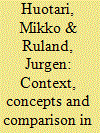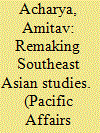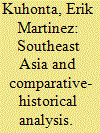|
|
|
Sort Order |
|
|
|
Items / Page
|
|
|
|
|
|
|
| Srl | Item |
| 1 |
ID:
182691


|
|
|
|
|
| Summary/Abstract |
In terms of spatial imaginaries and as physical infrastructure, the Belt and Road Initiative (BRI) spurs new geographies of comparative urban study. Irrespective of whether it is the primary driver for developments carried out in its name, ‘the BRI’ is a label that serves to bring previously unassociated project sites and non-place-based infrastructural developments into comparative relation. This paper considers some of the possibilities presented by the BRI for comparative urban studies in – and from – Asia. Building upon insights from postcolonial urban studies, planetary urbanisation and inter-Asia cultural studies, I sketch two key possibilities of the BRI as (comparative urban) method. The first concerns the BRI as a series of openings to much (spatially) wider and historically deeper forms of comparison. Second, I argue that BRI as method impels forms of urban comparison beyond conventionally territorialised units of analysis at a variety of scales, including both the city and the (area studies) region.
|
|
|
|
|
|
|
|
|
|
|
|
|
|
|
|
| 2 |
ID:
155224


|
|
|
|
|
| Summary/Abstract |
Founded in 1940 by scholars from China who were associated with the celebrated China-based tradition of Nanyang studies (Nanyang yanjiu), the South Seas Society became an illustrious name among Chinese intellectuals in parts of East Asia and Southeast Asia. Whereas the original Nanyang studies tradition was based on studying the Nanyang (now Southeast Asia) from mainland China's perspective, the Singapore-based Society was established with a slightly different aim: understanding the Nanyang through a Nanyang-centered perspective. In the aftermath of the Second World War, as the Society's connections with China gradually weakened, it also gained a reputation as a pioneer in the Chinese-language track of global Southeast Asian studies. This article suggests that the Society is a useful case study, focusing in particular on the Singapore-Malaya(sia) (Xinma) phase in the Society's history that lasted from 1958 to 1971. It argues that an analysis of how localization and globalization influenced the Society during this period can in turn shed new light on the broader topics of Chinese intellectuals in Singapore, ethnic Chinese communities and migration, Chinese identities, and the global development of Southeast Asian studies.
|
|
|
|
|
|
|
|
|
|
|
|
|
|
|
|
| 3 |
ID:
133783


|
|
|
|
|
| Publication |
2014.
|
| Summary/Abstract |
Debating the challenges of comparisons in Southeast Asian studies, the objective of this Special Issue is to advance the agenda of context-sensitive and methodologically reflected Comparative Area Studies (CAS). As a deliberate attempt to infuse new meaning into the embattled genre of area studies, CAS seeks to overcome increasingly rigid (sub-)disciplinary barriers often constructed around methodological arguments. Moreover, through stepping up the inclusion of non-Western regions in the research agenda, CAS also makes a decided bid to transcend the usually strongly Western-centric theory-building in most social science disciplines. This introduction locates the following articles in the broader context of the area studies-discipline divide. It highlights how the challenges of comparative research practice on different layers of social reality are at the heart of this divide but at the same time provide a productive ground for exchange in interdisciplinary Southeast Asian studies. We expand on the contributing authors' arguments by providing a typology of comparative research practice that captures the value of various forms of area studies comparisons and by reflecting on the conceptual preconditions for fruitful comparisons
|
|
|
|
|
|
|
|
|
|
|
|
|
|
|
|
| 4 |
ID:
179330


|
|
|
|
|
| Summary/Abstract |
Southeast Asian Studies (SEAS) in China has experienced significant changes in the past twenty years. China's rising political and economic power has stimulated growing demands for better understanding of the wider world, resulting in the rapid development of area studies in recent years. Although SEAS in China predated the relatively recent notion of ‘area studies’ by at least half a century, the boom in area studies has profoundly transformed the field, most notably by attracting a large number of scholars to conduct policy-relevant research. Not only does the ‘policy turn’ reflect shifts of research paradigms in the field of SEAS, but it is also consistent with some larger trends prevailing in China's higher education sector and rapidly changing society in general. This article shows that SEAS in China has grown even more imbalanced, as indicated by the rapid growth of language programmes, absolute domination of short-term policy research, and further marginalisation of humanistic subjects. To respond, Chinese universities have adopted new approaches to SEAS depending on their distinct disciplinary foundations, language coverage, faculty interests, and local governments’ policy preferences.
|
|
|
|
|
|
|
|
|
|
|
|
|
|
|
|
| 5 |
ID:
133785


|
|
|
|
|
| Publication |
2014.
|
| Summary/Abstract |
Southeast Asian studies faces multiple challenges, such as misgivings among its scholars regarding the field's geopolitical lineage, skepticism about the relevance of Area Studies in an era of globalization, and the rise of competing discipline-based approaches. But these challenges also provide the impetus for rethinking and broadening, especially through a closer engagement with disciplinary approaches and comparative studies. To this end, this paper highlights two possibilities: "transnational Area Studies" and "disciplinary regional studies." Together, they attest to the "promise of comparisons." Using examples such as the discourse on "Mediterranean analogy" in Southeast Asian historiography and the study of Southeast Asian regionalism by international relations scholars, this paper argues that comparisons need to go beyond analogies that do little more than serve as a self-vindicating "comfort zone" for the scholar. Also, comparisons can be enhanced by studying the processes and consequences of diffusion, not in the sense of establishing the universal validity of certain ideas and institutions, but of exploring their localization and contribution to diversity. Comparisons should not privilege an ideal type on the basis of which "others" are studied and judged. Citing the danger of Eurocentrism in comparing Southeast Asia with the Mediterranean, and ASEAN with the European Union, the paper argues that comparisons should recognize the significance of each case in terms of its own context. Such comparisons do not invoke a "spectre," but offer the promise of broadening Southeast Asian Studies to overcome the lingering doubts about the future of the field
|
|
|
|
|
|
|
|
|
|
|
|
|
|
|
|
| 6 |
ID:
133786


|
|
|
|
|
| Publication |
2014.
|
| Summary/Abstract |
This article seeks to assess the contributions and key characteristics of comparative-historical analysis in the field of Southeast Asian studies. It does so by examining three specific issues that emerge from this methodological genre: the conceptualization of the region of Southeast Asia, the role of theory, and the emphasis on macro structural ontology. These issues are analyzed in three disciplines: political science, history, and anthropology. The article shows that dialogue among comparative-historical researchers is most evident within the disciplines of political science and history. In anthropology, important comparative-historical work has also been produced but it has been less engaged within the comparative-historical canon. In reviewing these three disciplines' shared analytical concerns as well as contributions to comparative-historical analysis, the article makes an implicit case for greater interdisciplinary engagement across the disciplines.
|
|
|
|
|
|
|
|
|
|
|
|
|
|
|
|
|
|
|
|
|